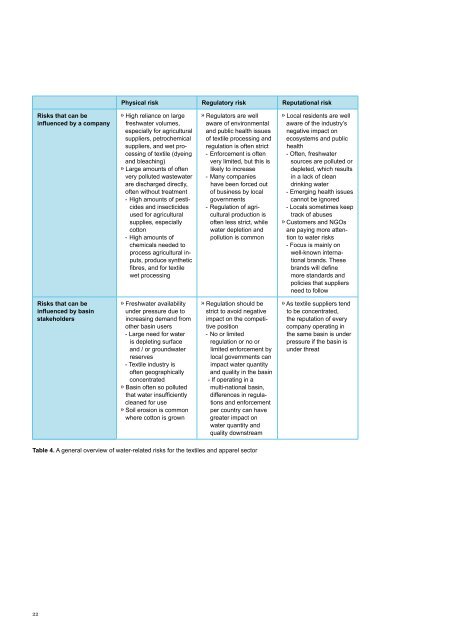YtDl2r
YtDl2r
YtDl2r
You also want an ePaper? Increase the reach of your titles
YUMPU automatically turns print PDFs into web optimized ePapers that Google loves.
Risks that can be<br />
influenced by a company<br />
Risks that can be<br />
influenced by basin<br />
stakeholders<br />
Physical risk Regulatory risk Reputational risk<br />
»»<br />
High reliance on large »»<br />
Regulators are well »»<br />
Local residents are well<br />
freshwater volumes,<br />
especially for agricultural<br />
suppliers, petrochemical<br />
suppliers, and wet processing<br />
of textile (dyeing<br />
and bleaching)<br />
»»<br />
Large amounts of often<br />
very polluted wastewater<br />
are discharged directly,<br />
often without treatment<br />
- High amounts of pesticides<br />
and insecticides<br />
used for agricultural<br />
supplies, especially<br />
cotton<br />
- High amounts of<br />
chemicals needed to<br />
process agricultural inputs,<br />
produce synthetic<br />
fibres, and for textile<br />
wet processing<br />
»»<br />
Freshwater availability<br />
under pressure due to<br />
increasing demand from<br />
other basin users<br />
- Large need for water<br />
is depleting surface<br />
and / or groundwater<br />
reserves<br />
- Textile industry is<br />
often geographically<br />
concentrated<br />
»»<br />
Basin often so polluted<br />
that water insufficiently<br />
cleaned for use<br />
»»<br />
Soil erosion is common<br />
where cotton is grown<br />
aware of environmental<br />
and public health issues<br />
of textile processing and<br />
regulation is often strict<br />
- Enforcement is often<br />
very limited, but this is<br />
likely to increase<br />
- Many companies<br />
have been forced out<br />
of business by local<br />
governments<br />
- Regulation of agricultural<br />
production is<br />
often less strict, while<br />
water depletion and<br />
pollution is common<br />
»»<br />
Regulation should be<br />
strict to avoid negative<br />
impact on the competitive<br />
position<br />
- No or limited<br />
regulation or no or<br />
limited enforcement by<br />
local governments can<br />
impact water quantity<br />
and quality in the basin<br />
- If operating in a<br />
multi-national basin,<br />
differences in regulations<br />
and enforcement<br />
per country can have<br />
greater impact on<br />
water quantity and<br />
quality downstream<br />
aware of the industry’s<br />
negative impact on<br />
ecosystems and public<br />
health<br />
- Often, freshwater<br />
sources are polluted or<br />
depleted, which results<br />
in a lack of clean<br />
drinking water<br />
- Emerging health issues<br />
cannot be ignored<br />
- Locals sometimes keep<br />
track of abuses<br />
»»<br />
Customers and NGOs<br />
are paying more attention<br />
to water risks<br />
- Focus is mainly on<br />
well-known international<br />
brands. These<br />
brands will define<br />
more standards and<br />
policies that suppliers<br />
need to follow<br />
»»<br />
As textile suppliers tend<br />
to be concentrated,<br />
the reputation of every<br />
company operating in<br />
the same basin is under<br />
pressure if the basin is<br />
under threat<br />
Table 4. A general overview of water-related risks for the textiles and apparel sector<br />
22


